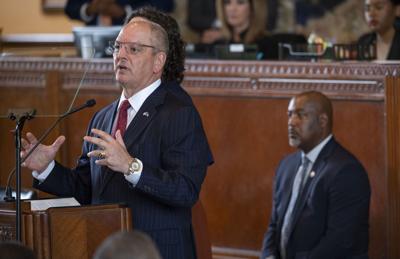John Bel Edwards’ mild manner and carefully chosen words — entirely appropriate for a Democratic governor maneuvering his way through a decidedly Republican state — sometimes belie his ambitions, not to mention his skill at taking the partisan temperature down a degree or two.
Both of these things were on display last week when Edwards addressed attendants at the American Clean Power Association conference in New Orleans.
Edwards’ session was about building bipartisan support for clean power, or rather removing the ideology from a conversation that’s too often overtaken by it. In places like Louisiana, that means embracing the necessary transition to cleaner fuel, even as the goal is received in some circles as an assault on the state's traditionally dominant but not-so-clean fossil fuel industry.
ACPA CEO Jason Grumet — who also happens to be the former head of the Bipartisan Policy Center — honed in on that challenge in his first question to Edwards.
As a Democratic governor with a net zero carbon commitment by 2050 in one of the “most energy intensive states in the country, but not just intensive in terms of what you produce but the culture of the state,” Grumet asked how Edwards finds common ground.
In Edwards’ telling, it’s actually not that difficult, particularly when the conversation is framed not around the important-but-divisive topic of environmental impacts, but on the universal goal of building the state’s economy.
He said the conflict between the two sides, while often overheated in political debate, isn’t as pronounced as people think. Industry has its own climate goals, he said, and is drawn to states that share them rather than those that are more reluctant.
There’s also a natural “symbiotic relationship” between old and new energy, he argued. It shows up when Louisiana companies participate in wind power projects in places like Block Island, sharing the expertise developed to support offshore oil. And there’s an advantage for future offshore wind development here, because companies will be able to share infrastructure costs with existing industry.
Edwards said his ambitious agenda — eliminating emissions and embracing not just offshore wind but hydrogen, carbon capture and cleaner-than-coal natural gas, all while showing respect for the existing fossil fuel establishment — has actually gotten more support than he’d originally expected, even from those who aren’t so sure climate change is real or caused by humans.
“Everybody understands economic development and job creation,” he said, not to mention the opportunities posed by federal money to support the transition right now.
“We do it in a way that we position ourselves in the middle and not on either extreme,” he said. “And I get criticized equally from the left and the right, which makes me believe I'm in exactly the right place.”
It seems to be a sustainable place in Louisiana, even if some might worry that the “all of the above” approach — with an emphasis on transitioning over time — lacks the necessary urgency given alarming scientific forecasts of climate change. Sea level rise and more intense storms impact this state more than most.
But ever the pragmatist, Edwards also cautioned against moving too quickly.
“The surest way to fail in our efforts to transition to a low-carbon future would be to try to do too much too fast, and we leave too many of our people in the cold and in the dark, and unable to transport themselves because the energy costs are too high, or that source of energy isn't available,” he said. “Quite frankly, I think people understand climate change. I think they want the transition to happen. And we're asking people to make decisions today that produce benefits today, but the biggest benefit comes in the next generations. … The American people, I suspect, are not quite that generous and forward looking.”
That’s a blunt observation from a politician who may never run for another office, but it's probably accurate, and it points not just to the need to be realistic but to sell a vision of the future that most people will be willing to buy. That's the kind of thing you learn to do when you’re in a position like Edwards has been in, politically.
It’s also a pretty smart approach to trying to do some very big things.

